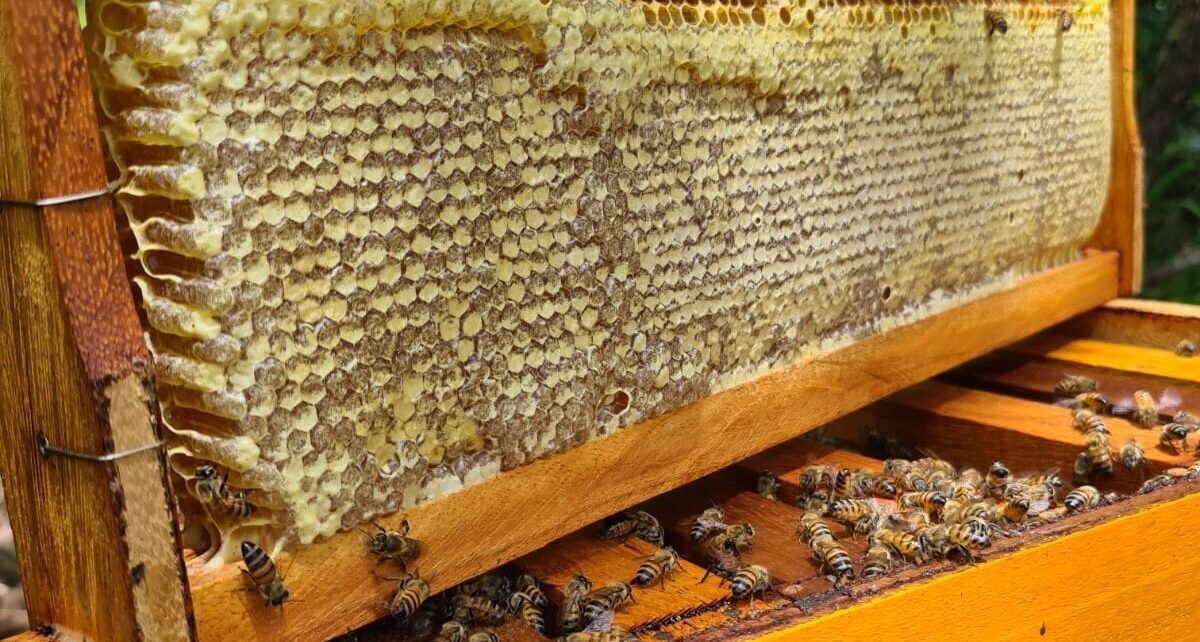Some estimate 1.5 tons of production
Amidst the flowering, the honey harvest began, which begins in August. Antônio Agêncio Pereira hopes to harvest 1.5 tons of the food in his four apiaries, in Jaciara. If he reaches the milestone, it will be the second major achievement for Antônio do Mel, as he is known. After courses from the National Rural Learning Service of Mato Grosso (Senar-MT) and guidance from Technical and Management Assistance (ATeG), the beekeeper has already tripled production from 400 to 1,200 kg.
Thanks to the knowledge acquired, five years ago Antônio left his job in the city to dedicate himself full time to beekeeping. “The beekeeping course at Senar opened up a horizon for us to work in this field. We boosted our production. With the assistance we hope to expand even further”, says the rural producer.

Today, the beekeeper works with 70 boxes of swarms divided between four apiaries, one on his property and the others in legal reserves in partnership with producers in the region. In addition to the benefits for his family’s income, Antônio feels fulfilled in being able to contribute to the environment. “Thanks to bee pollination we are contributing to a better environment. We are bringing these animals into the reserves, so that they can increase their population and contribute to environmental improvements. This is very rewarding.”

On the other side of the city, Mauro Bogato already worked with beekeeping as a hobby, but following the courses and assistance, he has already imagined himself working professionally in the area. “I took a basic and advanced course in beekeeping and queen bee production. The courses provided a foundation and ATeG helped us become more professional. With it, I started to manage beekeeping in a more professional way, applying management at the right time so as not to waste time or resources”, he explains.
Bogato has several apiaries, but on his property, Sítio Recanto das Abelhas, a nursery apiary was established. The diversity of beekeeping is what makes him feel more attracted to the activity. “We expect that in the very near future you will only live from this, because there are many possible sources of income such as honey, wax, propolis, pollen, swarm production, queen bee production and royal jelly. There are several options to develop throughout the year”, he highlights.

Due to the fluctuating climate in 2022, the beekeeper only managed to get 300 kg of honey. This year, the expectation is to double this mark. “This year, we have already improved to 40 kg per hive/year and we should reach 700 kg to 1 ton of production this harvest”, he states.
Field technician accredited by Senar-MT and beekeeper, Marcos Aurélio, highlights that the volume of rain contributes to this year being promising. “We have high expectations, due to the favorable weather. We hope for a good honey harvest.”
According to the professional, the assistance has contributed to presenting profitability to beekeepers in the region. “We analyze cost control, input and output revenue, we make a calculation so that the sale of a kg of honey exceeds the activity’s expenses. Through ATeG we show that it is possible to make a living from beekeeping, but with our feet on the ground and starting slowly,” he says.
HISTORY – The production chain began to develop in Jaciara in 2021, after basic beekeeping training offered by Senar-MT and the municipality’s Rural Union. At the time, Alberto Chiapinotto, president of the local union, was present at the training and encouraged the idea of organizing even further. “We suggested the creation of an association, they approved the idea and we were able to make our dream of developing beekeeping in the municipality come true”, he highlights.

Today, the São Lourenço Valley Beekeepers Association (Apivale) already has 42 members, and with the help of the City Hall, it will be the basis for Casa do Mel, an initiative that consists of an exclusive space for beekeepers and which is currently in progress. construction phase.
According to Chiapinotto, with the willpower of beekeepers to become professional, the need for technical assistance arose. “The producer knows how to produce, but the technique improves production and income. They are learning to produce better in less time and this has brought good results. Some went from 5 kg per hive to up to 30 kg per hive.”

METHODOLOGY – Beekeeping is one of the 13 production chains served by ATeG in the state. In total, 330 beekeepers are assisted on 11 fronts distributed across the municipalities of Alto Araguaia, Campo Verde, Diamantino, Jaciara, Juína, Lucas do Rio Verde, Porto dos Gaúchos, Rondonópolis and São José dos Quatro Marcos.
According to the area supervisor, Túlio Marçal, the assistance has helped in the management and management of properties. “Beekeeping has gained prominence in recent months, with good results and this has impacted on the increase in demand for technical assistance. Mato Grosso is still the 15th honey producing state, but we still have a lot to grow”, he highlights.
For beekeepers interested in receiving technical assistance, simply look for the Rural Union that serves your municipality and request assistance. It is the Union that will raise a group of interested parties and request the opening of a new ATeG front in the region.
BY SENAR: Nágera Dourado



